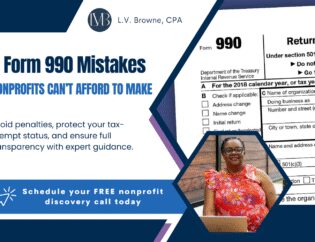
For many small business owners, forming an LLC or operating as a sole proprietor is the starting point. But as your business grows, so does your tax liability. One of the most powerful tools to help reduce that liability is making an S corporation election. The question is: when is the right time to make that move, and why does it matter?
In this post, we break down what an S corporation election is, how it can save you money, when it makes sense to elect, and what to consider before making the switch.
What Is an S Corporation Election?
An S corporation (or S corp) is not a type of business entity — it’s a tax classification available to eligible LLCs and corporations. When you elect S corp status with the IRS using Form 2553, your business becomes a “pass-through” entity for federal tax purposes. This means:
- You avoid the double taxation that typically applies to C corporations.
- The company itself doesn’t pay federal income tax.
- Profits and losses flow through to the owners’ personal tax returns.
The Main Tax Advantage: Splitting Salary and Distributions
The biggest tax advantage of electing S corp status comes from how self-employment taxes are calculated.
- As a sole proprietor or single-member LLC, you pay 15.3% self-employment tax on all net income.
- As an S corp owner, you are required to pay yourself a reasonable salary, which is subject to payroll taxes.
- Any remaining profit can be distributed to you as a dividend, which is not subject to self-employment tax.
This split allows you to reduce self-employment tax liability, which is why many growing business owners consider S corp election once their net income reaches a certain level.
When Should You Consider Electing S Corp Status?
S corp status can lead to major savings — but it’s not right for everyone. It may be a good fit if:
- You are ready to file the necessary forms and meet IRS deadlines.
- Your business earns net income of $40,000–$60,000 or more consistently.
- You plan to keep some profits in the business or distribute them.
- You are already taking steps to maintain solid bookkeeping and payroll systems.
IRS Deadline to Elect:
To elect S corp status for a given year, you must file Form 2553 within 2 months and 15 days after the beginning of that tax year. There are options for late filing.
Potential Pitfalls and Challenges to Consider
S corp election brings advantages — but it also comes with stricter rules and added complexity. For example, you must pay yourself a “reasonable salary,” which the IRS may scrutinize if it appears disproportionately low compared to your business’s net income.
Additional considerations include:
- Increased administrative needs: payroll setup, additional reporting, and tax filings
- Filing of a separate tax return each year (Form 1120-S)
- Some states charge additional fees or impose minimum taxes on S corporations
While the benefits can be substantial, S corps are best suited for business owners who are ready for the compliance responsibilities that come with tax savings.
How L.V. Browne, CPA Helps Our Clients Decide and Save
At L.V. Browne, CPA, we’ve helped small business owners across industries:
- Run the numbers to determine if an S corp election makes financial sense
- File Form 2553 accurately and on time
- Set up payroll and ensure compliance with reasonable salary requirements
- Maintain clean books and meet annual filing requirements
Our goal is to help you keep more of what you earn while staying fully compliant with IRS rules. We don’t just help you elect S corp status — we help you build a smart, sustainable tax strategy.
Ready to Find Out if an S Corp Is Right for You?
If your business is growing and you’re looking for ways to reduce your tax burden, it may be time to consider S corp status. But don’t guess — let us guide you through it.
Schedule your free consultation with L.V. Browne, CPA today and gain clarity on whether an S corp election is the next smart move for your business.
Let’s build your financial strategy on a strong foundation.










